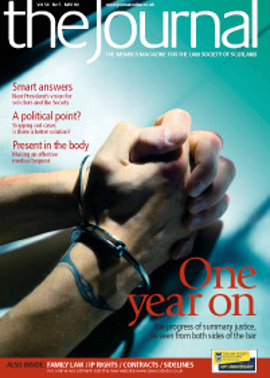Law reform update
Criminal law
The Society has responded to the Justice Committee’s call for written evidence on the Criminal Justice and Licensing (Scotland) Bill. The Society is of the view that the bill has been presented as a miscellaneous provisions type bill with a number of wide ranging proposals.
Both the Criminal Law Committee and the Licensing Law Subcommittee have been involved. Their submission can be accessed in full via the Society’s website. It includes substantial comment on a number of areas of the bill, including the proposed Sentencing Council, community payback orders, Crown appeals and a new statutory basis for disclosure of evidence. The Mental Health and Disability Law Subcommittee has also raised a point in relation to how the defence of mental disorder is framed in the bill.
The Criminal Law Committee has also submitted a response to the Scottish Law Commission’s Discussion Paper on Double Jeopardy. The committee agreed that the rule should be retained. It recognised, however, that the principle had evolved in a number of other English speaking jurisdictions such as England & Wales, Australia and New Zealand. It suggested that the principle of the rule is evolving and that in certain limited circumstances there should be an exception to the rule.
The “Better Laws Bill”
The Society set up a small working party to consider the Scottish Government’s proposal for an Interpretation and Legislative Reform (Scotland) Bill. The working party thought the bill, while very technical in nature, represented a worthwhile analysis of the current arrangement.
The response focused on the interpretation provisions, and on the working party’s view that the inclusion of a provision for the serving of documents by electronic means would create difficulties. The response also suggested that while general principles of interpretation might be a useful addition to the bill, further work would need to be done on this area.
Hybrid bills
The Law Reform Committee has responded to a call for evidence issued by the Standards, Procedures and Public Appointments Committee of the Scottish Parliament. This asked whether changes should be made to standing order rules to provide for scrutiny of hybrid bills: public bills which affect private interests.
In its response, the committee suggested a number of rule changes that would be necessary to introduce a private bill style consideration stage into the career of a Government bill. It also considered what rules would be necessary for determining whether a bill should fall into the hybrid scheme, and what further procedural rules should be put in place to deal with, for example, the introduction, publication and amendment of hybrid bills.
- More information on the above, as well as other work the Law Reform Department has been involved in this month and the full text of consultation responses, can be accessed via the Society’s website – www.lawscot.org.uk/ Public_Information/lawreform/ .
In this issue
- Obama's first 100 days
- Playing politics with the Scottish constitution
- Beneficiaries are suffering from the high cost of advice
- Ever forwards
- Shared principles
- A year of debate
- Ask the audience
- Property sales continue to fall
- Where fact makes law
- Giving up the body
- Playing politics with the constitution
- Matrix evolutions
- Make it happen
- View from the top
- Retiring thoughts
- Law reform update
- Phone a friend
- Lighting the way
- Is Big Brother watching too closely?
- Ask Ash
- Selection, the professional way
- A claims pandemic?
- Bumper crop
- A place in the sun?
- Equality redefined
- Taking diligence forward
- Scottish Solicitors' Discipline Tribunal
- Book reviews
- Website review






